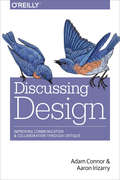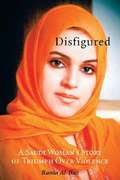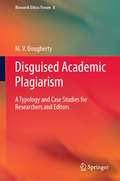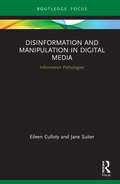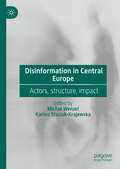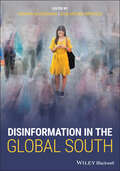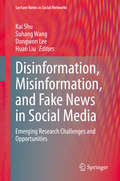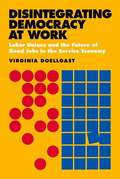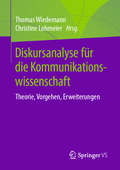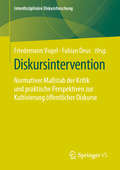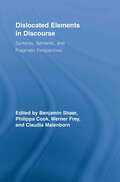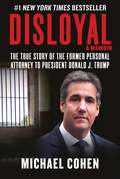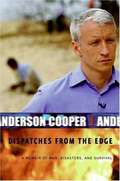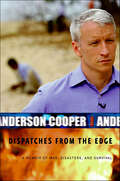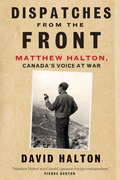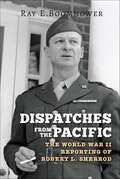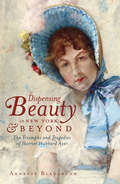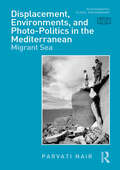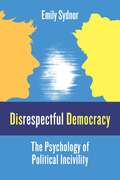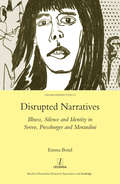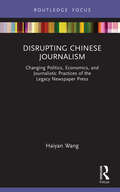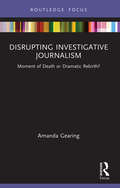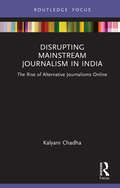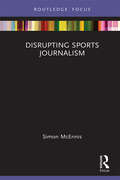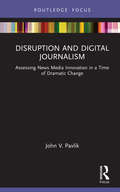- Table View
- List View
Discussing Design: Improving Communication and Collaboration through Critique
by Adam Connor Aaron IrizarryReal critique has become a lost skill among collaborative teams today. Critique is intended to help teams strengthen their designs, products, and services, rather than be used to assert authority or push agendas under the guise of "feedback." In this practical guide, authors Adam Connor and Aaron Irizarry teach you techniques, tools, and a framework for helping members of your design team give and receive critique.Using firsthand stories and lessons from prominent figures in the design community, this book examines the good, the bad, and the ugly of feedback. Youâ??ll come away with tips, actionable insights, activities, and a cheat sheet for practicing critique as a part of your collaborative process.This book covers:Best practices (and anti-patterns) for giving and receiving critiqueCultural aspects that influence your ability to critique constructivelyWhen, how much, and how often to use critique in the creative processFacilitation techniques for making critiques timely and more effectiveStrategies for dealing with difficult people and challenging situations
Disfigured: A Saudi Woman's Story of Triumph over Violence
by Catherine Spencer Rania Al-BazEvery morning for the past six years, Rania al-Baz has been the smiling face of a family program on Saudi television. She was a young, beautiful Saudi TV new anchor-the first woman to have such a job-when her abusive husband beat her into a coma and left her for dead. She remained in a coma for four days and later underwent thirteen operations to reconstruct her face. When she agreed to let horriying pictures of her ravaged face be made public, her story sparked general criticism of Saudi culture. A month after the tragedy, the first Saudi research into domestic violence began at King Saud University in Riyadh. Rania's story subsequently appeared in the press all over the world.
Disguised Academic Plagiarism: A Typology and Case Studies for Researchers and Editors (Research Ethics Forum #8)
by M. V. DoughertyThis volume is the first book-length study of disguised forms of plagiarism that mar the body of published research in humanities disciplines. As a contribution to applied research ethics, this practical guide offers a typology of the principal forms of disguised plagiarism. It provides detailed analyses, in-depth case studies, and useful flow charts to assist researchers, editors, and publishers in protecting the integrity of the body of published research literature. Disguised plagiarism is more subtle than copy-and-paste plagiarism; all its varieties involve some additional concealment that creates further distance between the plagiarizing text and its source. These disguised forms are the most difficult forms of plagiarism to detect. Readers of the volume will become acquainted with the subtler forms of plagiarism that corrupt the production and dissemination of knowledge in humanities fields. The book is valuable not only to those interested in research ethics, but also to those in humanities fields including philosophy, theology, and history.
Disinformation and Manipulation in Digital Media: Information Pathologies (Routledge Focus on Communication and Society)
by Jane Suiter Eileen CullotyDrawing on research from multiple disciplines and international case studies, this book provides a comprehensive and up-to-date understanding of online disinformation and its potential countermeasures. Disinformation and Manipulation in Digital Media presents a model of the disinformation process which incorporates four cross-cutting dimensions or themes: bad actors, platforms, audiences, and countermeasures. The dynamics of each dimension are analysed alongside a diverse range of international case studies drawn from different information domains including politics, health, and society. In elucidating the interrelationship between the four dimensions of online disinformation and their manifestation in different international contexts, the book demonstrates that online disinformation is a complex problem with multiple, overlapping causes and no easy solutions. The book’s conclusion contextualises the problem of disinformation within broader social and political trends and discusses the relevance of radical innovations in democratic participation to counteract the post-truth environment. This up-to-date and thorough analysis of the disinformation landscape will be of interest to students and scholars in the fields of journalism, communications, politics, and policy as well as policymakers, technologists, and media practitioners.
Disinformation in Central Europe: Actors, structure, impact
by Michał Wenzel Karina Stasiuk-KrajewskaThis book presents different approaches to disinformation based on original data from quantitative and qualitative studies conducted within CEDMO (Central European Digital Media Observatory). The linguistic and visual features of this type of communication are analyzed in the context of the discursive and genre framing of fake news. The authors discuss the psychological mechanisms of the reception of manipulated content, as well as the legal and political contexts of disinformation in Central Europe (Poland, the Czech Republic, Slovakia). The book presents the results of comparative research on attitudes to Covid-19 and the war in Ukraine, linking the two. The volume contains not only empirical studies, but also an elaborate proposal for a theoretical approach to manipulated content and a coherent methodological model that can be used to deepen scientific knowledge of this complex area of study.
Disinformation in the Global South
by Herman Wasserman Dani Madrid-MoralesA timely and incisive exploration of disinformation and its impact in the Global South In Disinformation in the Global South, media and communications scholars Herman Wasserman and Dani Madrid-Morales deliver a unique and geographically diverse collection of perspectives on the phenomenon of disinformation as it manifests in the Global South. In many parts of the Global South, coordinated political disinformation campaigns, rumor, and propaganda have long been a part of the social fabric, even before disinformation has become an area of scholarship in the Global North. The way disinformation manifests in this region, and responses to it, can therefore be highly instructive for readers around the world. Through case studies and comparative analyses, the book explores the impact of disinformation in Africa, Latin America, the Arab World and Asia. The chapters in this book discuss the similarities and differences of disinformation in different regions and provide a broad thematic overview of the phenomenon as it manifests across the Global South. After analyzing core concepts, theories and histories from Southern perspectives, contributors explore the experiences of media users and the responses to disinformation by various social actors drawing on examples from a dozen countries. Disinformation in the Global South also includes: A thorough introduction to Southern perspectives on national histories, theories of disinformation, and research methods in disinformation studies Global case studies of cultures of disinformation, including ethnographic insights into how audiences engage with disinformation Comprehensive explorations of responses to online and offline disinformation, including discussions of news literacy and the management of disinformation A valuable resource for scholars of disinformation everywhere, as well as senior undergraduate and graduate students in courses covering transnational or global perspectives to communication studies, Disinformation in the Global South is also an ideal reference for anyone studying or working in media or journalism.
Disinformation, Misinformation, and Fake News in Social Media: Emerging Research Challenges and Opportunities (Lecture Notes in Social Networks)
by Huan Liu Dongwon Lee Kai Shu Suhang WangThis book serves as a convenient entry point for researchers, practitioners, and students to understand the problems and challenges, learn state-of-the-art solutions for their specific needs, and quickly identify new research problems in their domains. The contributors to this volume describe the recent advancements in three related parts: (1) user engagements in the dissemination of information disorder; (2) techniques on detecting and mitigating disinformation; and (3) trending issues such as ethics, blockchain, clickbaits, etc. This edited volume will appeal to students, researchers, and professionals working on disinformation, misinformation and fake news in social media from a unique lens.
Disintegrating Democracy At Work
by Virginia DoellgastThe shift from manufacturing- to service-based economies has often been accompanied by the expansion of low-wage and insecure employment. Many consider the effects of this shift inevitable. In Disintegrating Democracy at Work, Virginia Doellgast contends that high pay and good working conditions are possible even for marginal service jobs. This outcome, however, depends on strong unions and encompassing collective bargaining institutions, which are necessary to give workers a voice in the decisions that affect the design of their jobs and the distribution of productivity gains. Doellgast's conclusions are based on a comparative study of the changes that occurred in the organization of call center jobs in the United States and Germany following the liberalization of telecommunications markets. Based on survey data and interviews with workers, managers, and union representatives, she found that German managers more often took the "high road" than those in the United States, investing in skills and giving employees more control over their work. Doellgast traces the difference to stronger institutional supports for workplace democracy in Germany. However, these democratic structures were increasingly precarious, as managers in both countries used outsourcing strategies to move jobs to workplaces with lower pay and weaker or no union representation. Doellgast's comparative findings show the importance of policy choices in closing off these escape routes, promoting broad access to good jobs in expanding service industries.
Diskursanalyse für die Kommunikationswissenschaft: Theorie, Vorgehen, Erweiterungen
by Thomas Wiedemann Christine LohmeierDie Diskursanalyse kann einen signifikanten Beitrag zur Kommunikationswissenschaft und zur sozialwissenschaftlichen Medienforschung leisten. Der Sammelband stellt grundlegende theoretische Positionen dar, diskutiert analytische Vorgehensweisen mit unterschiedlichem Datenmaterial, präsentiert empirische Forschungsbefunde und fragt nach künftigen Perspektiven sowie Erweiterungsmöglichkeiten diskursanalytischer Verfahren. Der Band liefert eine aktuelle Bestandsaufnahme in Sachen Diskursanalyse aus verschiedenen Disziplinen und plädiert für eine stärkere Integration dieser Forschungstradition in die Kommunikationswissenschaft.
Diskursintervention: Normativer Maßstab der Kritik und praktische Perspektiven zur Kultivierung öffentlicher Diskurse (Interdisziplinäre Diskursforschung)
by Friedemann Vogel Fabian DeusDie Diskursforschung kann einen wertvollen Beitrag zur Kultivierung öffentlicher, demokratischer Debatten leisten. Die pointierten Kurzbeiträge dieses Bandes diskutieren etablierte und neue Formen, theoretische Möglichkeiten und praktische Grenzen wissenschaftlicher Diskursintervention. Im Fokus stehen die drei folgenden Fragen: Darf, muss und kann das Intervenieren in öffentliche Debatten eine wissenschaftliche Aufgabe sein? Auf welche normativen Maßstäbe kann sich ein wissenschaftliches oder journalistisches Eingreifen in Diskurse legitimerweise berufen? Wie können Diskursforschende und Medienschaffende jenseits ihrer Domänen zu einer Aufklärung strategischer Kommunikation und für eine Waffengleichheit auf dem diskursiven Schlachtfeld der Gesellschaft beitragen?
Dislocated Elements in Discourse: Syntactic, Semantic, and Pragmatic Perspectives (Routledge Studies in Germanic Linguistics)
by Benjamin Shaer Philippa Cook Werner Frey Claudia MaienbornThis volume is about 'dislocation' – the removal of phrases from their canonical positions in a sentence to its left or right edge. Dislocation encompasses a wide range of linguistic phenomena, related to nominal and adverbial expressions and to the information structuring notions of topic and focus; and takes intriguingly different forms across languages. This book reveals some of the empirical richness of dislocation and some key puzzles related to its syntactic, semantic, and discourse analysis.
Disloyal: The True Story of the Former Personal Attorney to President Donald J. Trump
by Michael CohenOnce Donald Trump’s fiercest surrogate, closest confidant, and staunchest defender, Michael Cohen knows where the skeletons are buried. <p><p> This is the most devastating business and political horror story of the century. As Trump’s lawyer and “fixer,” Cohen not only witnessed firsthand but was also an active participant in the inner workings of Trump’s business empire, political campaign, and presidential administration. <p> This is a story that you have not read in newspapers, or on social media, or watched on television. These are accounts that only someone who worked for Trump around the clock for over a decade—not a few months or even a couple of years—could know. Cohen describes Trump’s racist rants against President Barack Obama, Nelson Mandela, and Black and Hispanic people in general, as well as the cruelty, humiliation, and abuse he leveled at family and staff. Whether he’s exposing the fact that Trump engaged in tax fraud by inflating his wealth or electronic fraud by rigging an online survey, or outing Trump’s Neanderthal views towards women or his hush-money payments to clandestine lovers, Cohen pulls no punches. <p> He shows Trump’s relentless willingness to lie, exaggerate, mislead, or manipulate. Trump emerges as a man without a soul—a man who courts evangelicals and then trashes them, panders to the common man, but then rips off small business owners, a con man who will do or say absolutely anything to win, regardless of the cost to his family, his associates, or his country. <p> At the heart of Disloyal, we see how Cohen came under the spell of his charismatic "Boss" and, as a result, lost all sense of his moral compass. <p> The real "real" Donald Trump who permeates these pages—the racist, sexist, homophobic, lying, cheating President—will be discussed, written about, and analyzed for years to come.<p> <b>A New York Times Bestseller</b>
Dispatches from the Edge: A Memoir of War, Disasters, and Survival
by Anderson CooperFew people have witnessed more scenes of chaos and conflict than Cooper, whose groundbreaking coverage on CNN has changed the way we view the news.
Dispatches from the Edge: A Memoir of War, Disasters, and Survival
by Anderson CooperOne of America’s leading reporters shares a deeply personal, extraordinarily powerful look at the most volatile crises he has witnessed around the world.A #1 New York Times BestsellerAnderson Cooper’s groundbreaking coverage on CNN has changed the way we watch the news. Few people have witnessed more scenes of chaos and conflict around the world. In this gripping, candid, and remarkably powerful memoir, he offers an unstinting, up-close view of the most harrowing crises of our time, and the profound impact they have had on his life—from the tsunami in Sri Lanka to the war in Iraq, from the starvation in Niger to the tragedy of Hurricane Katrina in New Orleans and Mississippi.Striking, heartfelt, and utterly engrossing, Dispatches from the Edge is an unforgettable story from one of America’s most trusted, fearless, and pioneering reporters.Praise for Dispatches from the Edge“A smart, soulful page-turner. . . . Cooper is a storyteller with plenty of heart.” —People“From the shores of Sri Lanka to the chaos of Hurricane Katrina, Cooper weaves his experiences at CNN into a moving memoir.” —Newsweek“His vignettes from the world’s horrscapes rise above the swagger of many journalistic memoirs because Cooper writes with competence as well as feeling.” —Washington Post Book World“Anderson Cooper gets New Orleans. . . . This is an emotional, personal reckoning with what he’s seen.” —New Orleans Times-Picayune
Dispatches from the Front
by David HaltonAs senior war correspondent for the Canadian Broadcasting Corporation during the Second World War, Matthew Halton reported from the front lines in Italy and Northwest Europe and became "the voice of Canada at war." His gripping, passionate broadcasts chronicled the victories and losses of Canadian soldiers and made him a national hero.Born in Pincher Creek, Alberta, in 1904, Halton was to achieve the fastest ever ascent in Canadian journalism. A year after joining the Toronto Daily Star as a cub reporter, he was in Berlin to write about Adolf Hitler's seizure of power and - long before most other correspondents - to begin a prophetic series of warnings about the Nazi regime. For more than two decades, he witnessed first-hand the major political and military events of the era. He covered Europe's drift to disaster, including the breakdown of the League of Nations, the Spanish Civil War, the sellout to Fascism at Munich, and the Nazi takeover of Czechoslovakia. Along the way he interviewed Franklin Delano Roosevelt, Hermann Göring, Neville Chamberlain, Charles de Gaulle, Mahatma Gandhi, and dozens of others who shaped the history of the century.In Dispatches from the Front, acclaimed former CBC correspondent David Halton, Matthew's son, also examines his father's often tumultuous personal life. He unravels the many paradoxes of his personality: the war correspondent who loathed bloodshed yet became addicted to the thrill of battle; the loner who thrived in good company; and, in some ways most puzzling of all, the womanizer with a deep and enduring love for his wife. Drawn from extensive interviews and archival research, this definitive biography is a captivating portrait of the life of one of Canada's most accomplished journalists.
Dispatches from the Pacific: The World War II Reporting of Robert L. Sherrod
by Ray E. BoomhowerIn the fall of 1943, armed with only his notebooks and pencils, Time and Life correspondent Robert L. Sherrod leapt from the safety of a landing craft and waded through neck-deep water and a hail of bullets to reach the shores of the Tarawa Atoll with the US Marine Corps. Living shoulder to shoulder with the marines, Sherrod chronicled combat and the marines' day-to-day struggles as they leapfrogged across the Central Pacific, battling the Japanese on Tarawa, Saipan, Iwo Jima, and Okinawa. While the marines courageously and doggedly confronted an enemy that at times seemed invincible, those left behind on the American home front desperately scanned Sherrod's columns for news of their loved ones. Following his death in 1994, the Washington Post heralded Sherrod's reporting as "some of the most vivid accounts of men at war ever produced by an American journalist." Now, for the first time, author Ray E. Boomhower tells the story of the journalist in Dispatches from the Pacific: The World War II Reporting of Robert L. Sherrod, an intimate account of the war efforts on the Pacific front.
Dispensing Beauty in New York & Beyond: The Triumphs and Tragedies of Harriet Hubbard Ayer
by Annette Blaugrund“An excellently researched mixture of history and biography about a maverick Victorian woman who made beauty her business.” —Barbara Goldsmith, New York Times-bestselling author Harriet Hubbard Ayer moved to New York City by 1883 and established Recamier Preparations, Inc., the earliest cosmetic company owned and operated by a woman. First with her creams and balms and then with her words about women’s health and beauty, she influenced several generations of women to look and feel good about themselves. The jealous and vindictive men in her life punished her for her ambition, accomplishments and independence by attempting to steal her lucrative business and seize her children. After she successfully sued them, they had her committed to an insane asylum. Indomitable, this former Chicago socialite reinvented herself as the highest paid newspaperwoman in the United States, editing the women’s pages of Joseph Pulitzer’s New York World. Her incredible story is presented here as never before.“Ayer emerges from Dr. Blaugrund’s portrait as an innovative entrepreneur, crack reporter, and pioneer of the American feminist movement.” —Sidney Offit, author, teacher, curator emeritus of the George Polk Journalism Award of the Author’s Guild “Just when we thought there were no more original American characters, along comes Annette Blaugrund’s fine biography of the little-known feminist pioneer Harriet Hubbard Ayer—her harrowing struggles, her inspiring achievements, her unexpected triumphs. What a marvelous tale written in a riveting manner!”—William A. Johnson, professor emeritus of philosophy, Brandeis University
Displacement, Environments, and Photo-Politics in the Mediterranean: Migrant Sea (Photography, Place, Environment)
by Parvati NairFocusing on the Mediterranean region from 2015 onwards, this volume explores photography’s engagement with displacement, a process that denotes the environmental and social breakdown of places and the forced mobility of people.The ongoing proliferation of photography of the displaced plays a crucial role in shaping opinions, by sensitising the public to the despair of displacement and hardening them to the trope through repeated exposure. Through a range of images by both established and amateur photographers, as well as ethnographic notes that draw from interviews with actors who are either displaced or working with the displaced, Parvati Nair questions the extent to which photography opens a space of possibility for the displaced in the face of globally dominant ideological drives that lead to the Anthropocene. Chapters focus on key aspects of this mass phenomenon, such as the question of crises no longer as exception but as historical process, the lived experiences of protracted relegation to borders and exposure to possible death, the prevalence of domicide and the spread of encampments, and the question of hope for the future.The book will be of interest to scholars in photography theory, migration and refugee studies, art history, Mediterranean studies, and political science.
Disrespectful Democracy: The Psychology of Political Incivility
by Professor Emily SydnorThe majority of Americans think that politics has an “incivility problem” and that this problem is only getting worse. Research demonstrates that negativity and rudeness in politics have been increasing for decades. But how does this tide of impolite-to-outrageous language affect our reactions to media coverage and our political behavior?Disrespectful Democracy offers a new account of the relationship between incivility and political behavior based on a key individual predisposition—conflict orientation. Individuals experience conflict in different ways; some enjoy arguments while others are uncomfortable and avoid confrontation. Drawing on a range of original surveys and experiments, Emily Sydnor contends that the rise of incivility in political media has transformed political involvement. Citizens now need to be able to tolerate or even welcome incivility in the public sphere in order to participate in the democratic process. Yet individuals who are turned off by incivility are not brought back in by civil presentation of issues. Sydnor considers the challenges in evaluating incivility’s normative benefits and harms to the political system: despite some detrimental aspects, certain levels of incivility in certain venues can promote political engagement, and confrontational behavior can be a vital tool in the citizen’s democratic arsenal. A rigorous and empirically informed analysis of political rhetoric and behavior, Disrespectful Democracy also proposes strategies to engage citizens across the range of conflict orientations.
Disrupted Narratives: Illness, Silence and Identity in Svevo, Pressburger and Morandini
by Emma BondIf Madame Bovary's death in Flaubert's 1857 novel marked the definitive end of the Romantic vision of literary disease, then the advent of psychoanalysis less than half a century later heralded an entirely new set of implications for literature dealing with illness. The theorization of a potential unconscious double (capable of expressing the body, and thus also the intimate damage caused by disease) in turn suggested a capacity to subvert or destabilize the text, exposing the main thread of the narrative to be unreliable or self-conscious. Indeed, the authors examined in this study (Italo Svevo (1861-1928), Giorgio Pressburger (1937-) and Giuliana Morandini (1938-)) all make use of individual 'infected' or suppressed voices within their texts which unfold through illness to cast doubt on a more (conventionally) dominant narrative standpoint. Applying the theories of Freud and more recent writings by Julia Kristeva, Bond offers a new critical reading of the literary function of illness, a function related to the very nature of narration itself.
Disrupting Chinese Journalism: Changing Politics, Economics, and Journalistic Practices of the Legacy Newspaper Press (Disruptions)
by Haiyan WangDisrupting Chinese Journalism provides a rich insight into the disruptive effects of digital technologies – especially smart-phones – on the Chinese print media market. Pulling from an extensive corpus of original research, including 191 face-to-face interviews with managers and journalists, and a content analysis of some 4,000 news reports, Haiyan Wang examines how Chinese legacy newspapers have responded to the changing digital media environment, including by adapting their organizational structures, revenue models, and journalistic practices. This book also points to how the government has taken a more interventionist stance on editorial content, and how this has further complicated the digital transitions of the Chinese media. This book is an invaluable resource for students of media studies, journalism, Chinese area studies, and digital technology.
Disrupting Investigative Journalism: Moment of Death or Dramatic Rebirth? (Disruptions)
by Amanda GearingThis book makes the case for the enormous potential embodied in investigative journalism if reporters collaborate in the digital sphere and engage with emerging techniques and technologies. Bringing together personal narratives from investigative journalists who have successfully found, verified and published stories using social media platforms and Web based communications, Disrupting Investigative Journalism explores the risks and benefits that come from this kind of digital collaboration. Citing how digital connection has enabled reporters around the world to form the International Consortium of Investigative Journalists, which in turn led to such global news sensations as the Panama Papers and the Paradise Papers, this book makes a practical argument for how the daily work of investigative journalism can change to capture enormous latent potential. This is a valuable text for students and scholars in the fields of investigative journalism, media and digital communication.
Disrupting Mainstream Journalism in India: The Rise of Alternative Journalisms Online (ISSN)
by Kalyani ChadhaDisrupting Mainstream Journalism in India offers a comprehensive and empirically-grounded analysis of the production of digital journalism by marginalized groups within Indian society.Drawing on in-depth interviews with practitioners as well as samples of news content, the author critically examines the way in which varied forms of digital alternative journalism provide socially, economically and politically disadvantaged groups with new and unprecedented opportunities to express their own perspectives, as well as offering alternatives to the hegemony of mainstream news narratives. These marginalized groups include women, Dalits and Muslims whose voices tend to be erased or misrepresented within the public sphere. By exploring these disruptions, Chadha offers insight into not only into the new media landscape of India but also its implications for journalism and democracy at large.Disrupting Mainstream Journalism in India is a valuable empirical resource for students and scholars interested in Indian media, journalism and democracy.
Disrupting Sports Journalism (Disruptions)
by Simon McEnnisThis book critically explores the impact that digital technology has had on the practices and norms of sports journalism. In the wake of major digital disruptions in news reporting, the author analyses how sports journalism has been particularly vulnerable to challenges and attacks on its expertise because of its historically weak commitment to professionalism. Ultimately, an argument is built that sports journalism’s professional distinctiveness will depend on its capacity to produce rigorous news work at a time when its core, routinised practices are being displaced by bloggers and team media. Recent developments such as The Athletic, a start-up that has built its business model around quality sports storytelling, and the impact of the COVID-19 pandemic offer hope that a paradigm shift in digital sports journalism culture towards serious reporting is starting to emerge. The question for both the industry and scholars going forward is whether these changes will crystallise and take hold in the long term. Disrupting Sports Journalism is a valuable text for researchers and students in sports media and journalism studies, as well as for industry professionals seeking an insight into developments in the field.
Disruption and Digital Journalism: Assessing News Media Innovation in a Time of Dramatic Change (Disruptions)
by John V. PavlikThis book offers a timely insight into how the news media have adapted to the digital transformation of public communication infrastructure. Providing a conceptual roadmap to understanding the disruptive, innovative impact of digital networked journalism in the 21st century, the author critically examines how and to what extent news media around the world have engaged in digital adaptation. Making use of data from news media content production and distribution both off- and online, as well as user and financial data from the U.S. and internationally, the book traces how the news media embraced and reacted to key developments such as the invention of the World Wide Web in 1989 and the launch of Google in 1998, Facebook in 2004, and the Apple iPhone in 2009. The author also highlights innovative organizations that have sought to reimagine news media that are optimized for digital, online, and mobile media of the 21st century, demonstrating how these groups have been able to stay better engaged with the public. Disruption and Digital Journalism is recommended reading for all academics and scholars with an interest in media, digital journalism studies, and technological innovation.
